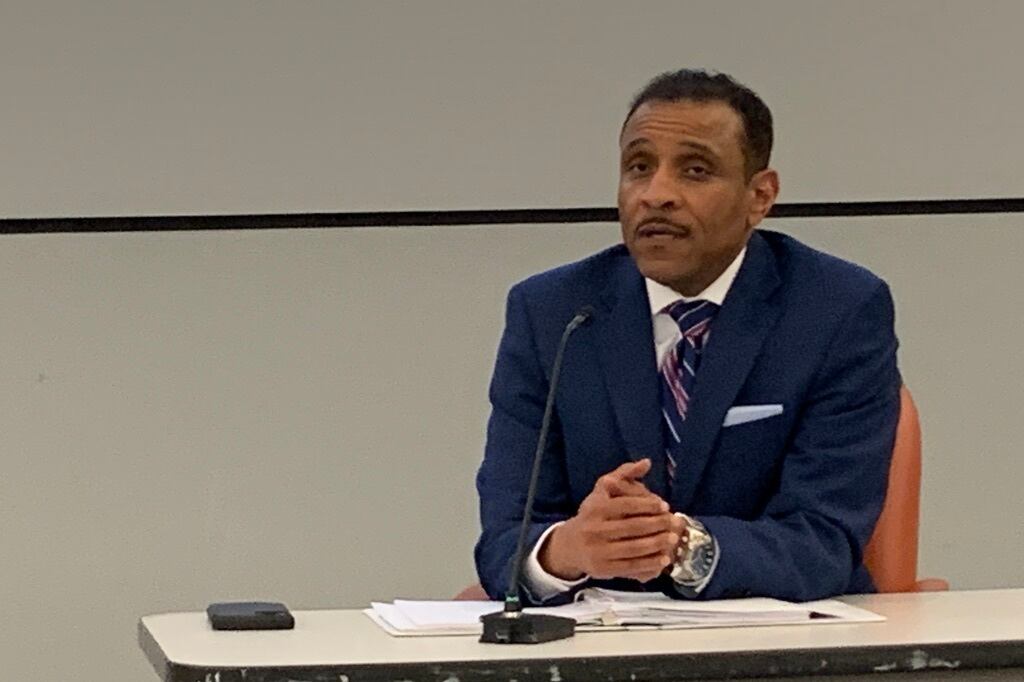Where does student success start? Tony Watlington, one of three finalists to be Philadelphia’s next schools superintendent, has a clear answer: Success begins with great teachers.
The “number one ingredient” in any plan to improve students’ academic performance is recruiting, supporting, and training “high-quality teachers,” Watlington said on Wednesday as he made his case to parent and student groups in the city.
“I think the school district of Philadelphia can be a beacon of hope” for other majority Black and brown cities that shows “what academic excellence looks like,” said Watlington, who is currently the superintendent of the 18,000-student Rowan-Salisbury district in North Carolina.
Watlington said if he gets the job, he’ll “be very visible throughout Philadelphia,” engaging in face-to-face town halls, focus groups, and meetings with parent committees. Watlington also said he’d visit schools and talk to teachers on the front lines to make sure he gets their views as well. “I am not a bureaucrat,” he said. “I am a teacher.”
Last week, the Philadelphia Board of Education announced that Watlington, along with John Davis and Krish Mohip, are the finalists to take over for Superintendent William Hite, who is stepping down after the school year ends. Davis, a top official in Baltimore schools, met with Philadelphia parents and educators on Monday, while Mohip, an official with the Illinois state school board, did the same on Tuesday.
Board President Joyce Wilkerson said the board hopes to make a decision about the next superintendent during the week of March 21. She also said the three finalists would have to make the effort to get to know the city.
“We want to make sure we have all the voices around the table,” Watlington said Wednesday. “When you engage with the public, particularly parents, at that level, it can sometimes be a little bit messy. I’m not at all troubled or bothered by those hard and tough questions.”
Strong principals and rigorous curriculum key for Watlington
During his public events in Philadelphia, Watlington discussed several pressing topics for city schools, from funding and curriculum to standardized testing, in addition to the teacher workforce.
Watlington told a town hall Wednesday evening that he started his career in education as a bus driver and custodian, before becoming a history teacher. He also said that growing up poor, his mother buying a set of World Book encyclopedias was a life-changing experience for him.
His background “as a free and reduced lunch student myself who came up from the other side of the tracks,” he said, makes him the “ideal candidate” for this job.
To encourage future teachers, “we should be identifying kids as early as middle school” as strong candidates for the profession, he said. And he suggested using public and private funds to pay for these students to go to college, then have them return to teach in the Philadelphia school district for four years once they graduate. He said it is especially important to recruit Black male teachers.
It’s also important to have “really strong, effective principals” to recruit and retain teachers, he said.
Asked by the leader of a charter school for his opinion of “performance-based pay” for teachers, Watlington said it was “worth having the conversation” about it, but also said he wanted to learn more about how the city operates. He also said any system for judging performance should use multiple measures like students’ input, and not just test scores, in order to identify the strongest teachers.
Watlington said he’s in favor of teachers getting “dual certification” that includes special education teaching, and told parents that this represented a “gold standard” for teachers. On a related issue, Watlington also said he would consider auditing the district’s process governing Individualized Education Programs.
A “rigorous curriculum” is another key to a good school system, said Watlington.
To be successful in the later grades, students need to have experience with upper-level math in middle school, Watlington said. He said he’d push to make Advanced Placement courses and early-college programs available to students. “Studies have shown, and we know this, kids who get Algebra 1 by seventh grade, or sometimes as early as sixth grade, they get on an accelerated track,” he said.
While Watlington said it’s the job of educators to prepare students for standardized tests, he also acknowledged that certain biases are built into those exams. “We just need to figure out how to get all of our children more opportunities to demonstrate their learning,” he said.
Watlington said he’d “absolutely” continue current Superintendent William Hite’s fight to get more money for Philadelphia schools, while also noting that it’s important for city schools to show they’ve been “effective and efficient with the dollars we have.”
His North Carolina district obtained a state waiver that allowed it some autonomy over its budget, and as a result, increased its statewide literacy ranking from 96th out of 115 districts to 74th, Watlington said.
Telling a group of high school students that they lived in a “historic city” where the Declaration of Independence and U.S. Constitution were signed, Watlington called providing access to an excellent education the “unfinished work” of the Declaration of Independence.
“I’ve been really impressed to see a large, majority Black and brown school district improve its financial health and do some really good things,” Watlington said.
Chalkbeat Philadelphia Senior Writer Dale Mezzacappa contributed to this story.





